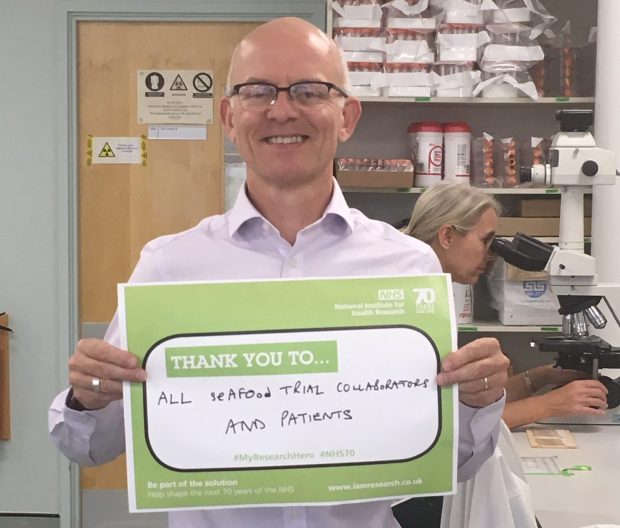
If you work in bowel cancer screening you may have recently read about a trial I led about treatment options for people at higher risk of bowel cancer.
The name of the trial is certainly one you can't forget. We named it seAFOod not because we all love fish, but because we were testing a component of fish oil called EPA and aspirin on patients.
During the trial we measured the number of bowel polyps (non-cancerous growths that can turn into cancer) on patients from the bowel cancer screening programme. We looked in particular at patients who had just undergone a colonoscopy (where a camera is used to look inside the bowel) and had several polyps removed.
We deliberately chose to test aspirin and EPA capsules on individuals who already had several polyps removed as we know that future risk of polyps and cancer is higher in people who have had more polyps in the past.
These patients were randomly asked to take one of the following every day for a year:
- EPA capsules giving them a dose roughly the same as eating about 10 portions of oily fish like sardines or mackerel a week
- a low-dose aspirin tablet
- both the EPA capsules and an aspirin tablet
- dummy capsules and a dummy tablet (placebo only)
None of the trial staff or the participants knew which treatment was being used by each individual. After a year they each had a second colonoscopy and the number and type of polyps that had reappeared were counted.
Findings
People who took the EPA capsules or the aspirin tablet were found to have fewer bowel polyps which adds to what we already know about the potential benefits of taking aspirin for some people at higher risk of bowel cancer.
We found that the combination of EPA and aspirin together might be better than either alone, but this needs more research to confirm.
Help from the programme
The trial definitely raised the bar compared with previous polyp prevention trials and I don’t think it would have been possible without the full support of the screening programme.
Suitable patients were identified by nurses and doctors and we had massive help coordinating the hospital visits. Lots of people helped with various tasks and paperwork on top of their normal day-to-day activities. We therefore owe them a big ‘thank you’.
The other group of people who deserve our gratitude are the members of the bowel cancer screening research advisory committee (RAC). This is the group of staff working with Public Health England responsible for approving and monitoring research in the programme.
In particular they check that the research, evaluation and audit is feasible and is of high quality, thus protecting the safety of patients. NHS screening programmes encourage well designed research that addresses important new questions that will inform, guide and improve the programmes and I'm glad to say we met these criteria.
The RAC carry out a role which often goes unnoticed, and can therefore sometimes be under-appreciated, but without them this trial simply would not have been possible.
Find out more
An in-depth description of our trial is available, including a plain English summary of the trial results which was written for people who took part, but can be read by anyone.
A more technical scientific paper describing the results is available for anyone to read in The Lancet journal.
Disclaimer and PHE advice
This blog provides information about independent research supported by PHE. The views expressed are those of the researchers and not those of PHE.
The study is a useful reminder of the importance of a healthy balanced diet but does not provide a sufficient basis to change current government advice. The Eatwell Guide visually shows the types and proportions of food that help us achieve a healthy weight and live a healthy life. Overall it is better to get our nutrients from a variety of foods within a healthy balanced diet than from individual or multiple supplements.
The Eatwell Guide includes messages of particular relevance to the prevention of bowel cancer – to base meals on higher fibre foods and eat less red and processed foods. In relation to fish oils, a healthy diet should include at least two portions of fish a week, including one of oily fish.
PHE Screening blogs
PHE Screening blogs provide up to date news from all NHS screening programmes. You can register to receive updates direct to your inbox, so there’s no need to keep checking for new blogs. If you have any questions about this blog article, or about population screening in England, please contact the PHE screening helpdesk.